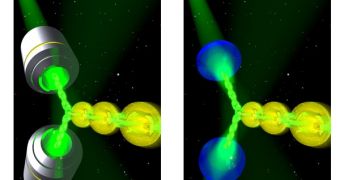The idea of pulling things towards us with our minds or some technological implement, without actually using any physical means, is one that fantasy and Sci-Fi fiction has been playing with for decades, if not centuries.
Science Fiction even popularized the idea of tractor beams to such a point that every series of this genre worth its salt will use the idea, or a variation of it.
Since much of what was Sci-Fi last century is now reality, scientists figured they may invent tractor beams too.
They haven't gotten to the point where they can pull space ships from orbit just by flashing a ray at them, but they did manage to demo a beam at particle level.
A team of scientists from the Czech Republic's Institute of Scientific Instruments and Scotland's University of St. Andrews have successfully created an optical field that flipped the usual pressure and began pulling small particles towards the light.
The method relies on negative radiation pressure and can actually have practical uses in fields like medicine, where cells would be possible to sort based on material by pulling them aside into groups.
“Because of the similarities between optical and acoustic particle manipulation we anticipate that this concept will provide inspiration for exciting future studies in areas outside the field of photonics,” said Dr Tomas Cizmar, Research Fellow in the School of Medicine at the University of St Andrews and leader of the project.
Johanes Kepler was the first who observed the phenomenon of radiation force, when he noticed the trails of comets always moving away from the sun.
Most optical fields cause repulsion, but researchers found, in recent years, that there is a space of parameters in which that force reverses.
“These methods are opening new opportunities for fundamental phonics as well as applications for life-sciences,” stated Dr Oto Brzobohaty, another professor from the Institute of Scientific Instruments (ISI).

 14 DAY TRIAL //
14 DAY TRIAL //